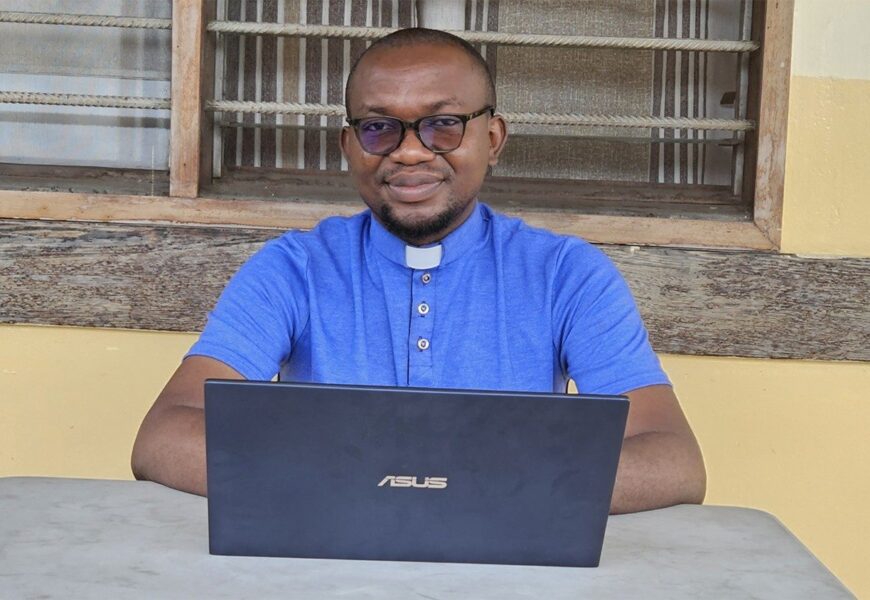Fr. Paul Samasumo from Vatican News recently engaged in a discussion with Fr. Joel Nkongolo, a native of Congo, regarding the influence of artificial intelligence (AI) on the African Church. Frank Nkongolo’s headquarters are presently located in Nigeria.
Fr. Paul Samasumo – Vatican City. How would you describe the concept of “AI” or what is your definition of it?
Artificial intelligence encompasses a diverse array of tools and techniques that enable devices to simulate human cognitive functions. Machine learning, a subset of AI, enables devices to learn from data without explicit programming. An example is Netflix, which utilizes recommendation algorithms to analyze users’ viewing histories and suggest relevant content. Additionally, computer vision technologies, another facet of AI, drive facial recognition systems used in security and authentication applications.
Is there cause for concern or fear regarding Artificial Intelligence?
While AI offers numerous benefits such as enhanced efficiency, productivity, and innovation, it also raises valid apprehensions. Job displacement is a significant worry as automation could replace tasks previously performed by humans. Studies, like one by the McKinsey Global Institute, suggest that up to 800 million jobs may be automated by 2030. Moreover, ethical dilemmas surround AI, including algorithmic bias that perpetuates discrimination and injustice. For instance, research reveals that individuals with darker skin tones experience higher error rates with facial recognition systems, leading to unjust treatment, especially in contexts like law enforcement.
The adoption of AI in Africa appears to be progressing slowly. Is this a positive or negative development?
Africa’s uptake of AI has been relatively sluggish compared to other regions due to factors such as limited infrastructure, digital literacy, and funding. However, this deliberate approach can also be viewed as an opportunity to address underlying issues and prioritize societal concerns. For instance, Ghana recently established two AI centers to enhance AI capabilities while ensuring ethical AI deployment. By adopting a strategic approach, African nations can tailor AI solutions to local needs and mitigate potential adverse impacts.
What impact do you anticipate Artificial Intelligence will have on the Church in Africa and elsewhere? Should the Church be concerned about Artificial Intelligence?
AI has the potential to enhance church operations, such as automating administrative tasks, analyzing congregational demographics for targeted outreach, and providing personalized spiritual guidance through chatbots. However, ethical considerations, such as safeguarding data privacy and preserving human relationships amidst technological advancements, are crucial. For example, certain sectors of the Church of England utilize AI-powered chatbots for online member communication, pastoral care, and prayer support. While AI can aid the Church in expanding its ministry, upholding ethical standards in its implementation is paramount.
How can the Church promote ethical conduct and responsible behavior on social media?  Social media symbols
Social media symbols
To promote ethical behavior and responsible online conduct, the Church can leverage its moral authority. For instance, Pope Francis has denounced the proliferation of fake news and social media polarization, emphasizing the importance of truth and dialogue. Initiatives like “Digital Catholicism” utilize online media platforms for evangelization while advocating the Gospel in real-time. By exemplifying ethical conduct and offering guidance on digital citizenship, the Church can foster a culture of respect, empathy, and authenticity in virtual interactions.
How can parents, educators, clergy, or pastors assist young individuals in avoiding over-reliance on these technologies?
Adults play a pivotal role in encouraging healthy digital habits and guiding young people’s technology usage. Parents and teachers can educate children on the risks of excessive screen time and the importance of balance between online and offline activities. Establishing boundaries on device usage, promoting outdoor play, and encouraging face-to-face interactions are effective strategies. Furthermore, religious leaders can incorporate teachings on mindfulness, self-discipline, and responsible technology stewardship into their spiritual guidance, helping young individuals cultivate a positive relationship with digital media.
Can individuals and society take measures to safeguard themselves against potential AI misuse or threats from non-democratic regimes?  Fr Nkongolo
Fr Nkongolo
Individuals and civil society organizations can proactively safeguard against the misuse of AI by authoritarian governments. Advocating for legislation that protects digital rights, privacy, and freedom of expression is crucial. Utilizing tools like virtual private networks (VPNs) and encrypted messaging apps can help individuals evade government surveillance and censorship. Additionally, international cooperation among democratic nations can bolster efforts to hold oppressive regimes accountable for AI-related human rights violations.
What advice would you offer to educators teaching AI in schools or institutions?
Educators play a vital role in preparing students for an AI-driven future by fostering critical thinking, creativity, and ethical decision-making skills. Integrating AI literacy into the curriculum can enhance students’ understanding of AI mechanisms, societal implications, and ethical considerations. Initiatives like Google’s AI for Social Good provide educational resources for teaching AI concepts in classrooms. By empowering students to become responsible users and innovators of AI, teachers can effectively equip them to navigate the opportunities and challenges of the digital era.
Fr. Nkongolo, thank you for your insights and guidance on navigating these complex issues.
Fr. Paul Samasumo, these examples, comparisons, and statistics underscore the multifaceted nature of AI and its impact on society, including the Church and education. I trust that they offer a comprehensive analysis of these nuanced topics.










